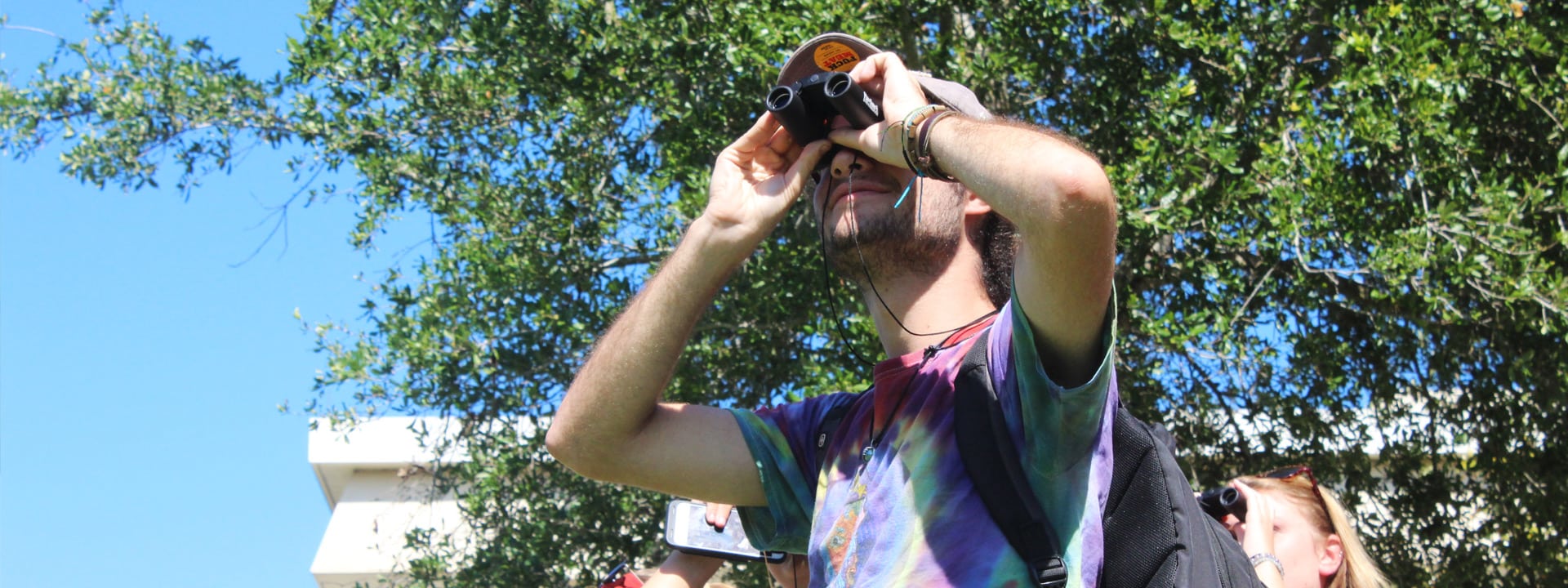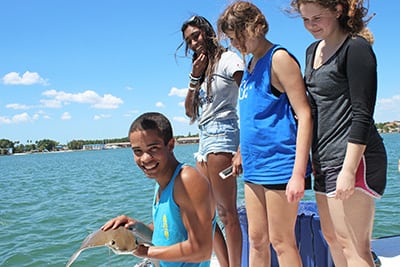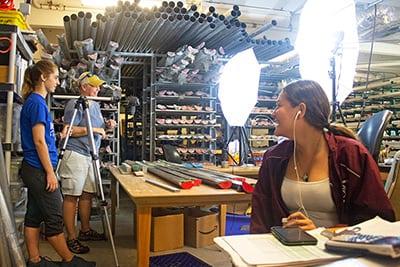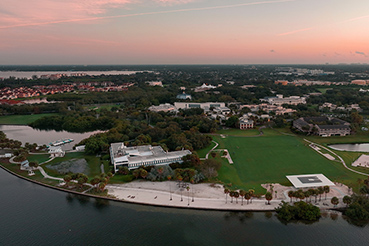Jump-start your first year with real research
Every year, we invite 20–25 bright new students to work side by side with our professors on their research.
At any given time, we may have active projects in psychology, communication, ancient studies, literature, religious studies, management, theatre, international business, biology and marine science. It’s a great way to get some research experience and see if what you think you’re interested in is really the major for you.
Students receive a one-year stipend of up to $1,000. Applications must be submitted by February 1.
One-year stipends worth up to $1,000
Meet a first-year research associate

Associateships for the 2026-27 academic year
An Online Guide to Derek Walcott's Omeros
Field: Literature
Faculty: Dr. Jared Stark
About the Project
We are creating an online guide to Nobel laureate Derek Walcott’s poem Omeros. For this digital humanities projects, students will be involved in editing entries, compiling an updated bibliography, creating a glossary to the poem, and choosing images for the website. Published in 1990, Omeros draws loosely on the Homeric epics (the Iliad and the Odyssey) to tell a story of the modern Caribbean. Students will hone skills in scholarly research, website design and management, and digital humanities project development.
Jared Stark received his Ph.D. in Comparative Literature from Yale University. Before joining the Eckerd faculty in 2004, he held visiting appointments at Cornell University and New York University and was awarded a junior faculty fellowship by the American Council of Learned Societies and the Mellon Foundation. His teaching and research focus on interdisciplinary approaches to modernism, the history of the novel, literary criticism, postcolonial literatures, and Holocaust studies. His articles have dealt with topics including Edith Wharton’s fiction, the history of photography, and the literature of the Holocaust.
Art in Society
Field: Sociology
Faculty: Dr. Nick Dempsey
About the Project
For an upcoming textbook on the sociology of art, we are currently reviewing recent publications about the place of art in society. That includes such themes as how art is produced in collaborations between artists and nonartists, how some art is perceived as valuable or “trashy,” and the role of art in social movements. Students will be engaged in seeking, reading, and summarizing recent books and articles on relevant subjects.
Dr. Nicholas P. Dempsey earned his Ph.D. at the University of Chicago. His teaching and research interests include sociological theory, culture and the arts, urban sociology, and social stratification.
Birds on the Move: Resighting Banded Water Birds
Fields: Environmental Studies and Biology
Faculty: Dr. Beth Forys
About the Project
Researchers put identifying bands on seabirds, shorebirds and wading birds to learn about their population sizes, movements, and habitat use. You will join a team of students who go to local beaches and wetlands to photograph banded birds including Black Skimmers, Red Knots, and Piping Plovers. You will help enter this important data and map these birds during the fall, winter and spring. You will share your results with the group at meetings every other week.
Dr. Forys is a professor in Eckerd’s Environmental Studies and Biology disciplines. She is a conservation biologist interested in spatial ecology and endangered species. She teaches Environmental Biology, Conservation Biology, GIS, Research Methods and Field Ornithology.
Cybersecurity Trends in SEC Filings
Field: Business Administration and Management
Faculty: Dr. Thomas Lombardi
About the Project
Corporations file several documents a year with the U.S. Securities and Exchange Commission (SEC) to report their financial statements and other formal reports due to the U.S. Government. In recent years, the SEC has changed its reporting requirements to include material cybersecurity incidents. In other words, corporations are now required to document when they have suffered cybersecurity breaches that have or may adversely affect stockholders and investors. This big data project collects these filings and analyzes the details of the reports to learn about cybersecurity trends in business over the past few years.
Please note this research project involves applied mathematics and programming in Python, R, and Linux.
Professor Lombardi maintains an active research program focused on the application of information systems, technology and data in many fields. Prior to joining Eckerd College, Professor Lombardi taught information systems and technology at University of the Virgin Islands and served as IT Manager and Software Developer at OrangeWave Innovative Science, LLC. Most recently, his academic and professional work addressed the information systems required to support the Virgin Islands Robotic Telescope at Etelman Observatory in the U.S. Virgin Islands. His past research includes studies in digital humanities, bioinformatics, and network science. Currently, he is investigating the role of trade secrets in small business development.
Exploring Dog Behavior and Cognition
Field: Psychology and Animal Studies
Faculty: Dr. Lauren Highfill
About the Project
In this project, we study how dogs think, solve problems, and interact with new challenges. Past projects have included dogs playing simple “video games” designed to test learning and memory, as well as experiments on problem-solving and social behavior. Students will gain hands-on experience working with dogs and will also collaborate with other student researchers on data collection, video coding, and analysis. This associateship is a great way to explore the growing field of animal cognition while developing transferable research skills.
Dr. Lauren Highfill joined the faculty at Eckerd in 2008. She led the creation and approval of the Animal Studies major in 2018. The courses she teaches include Introduction to Psychology, Biopsychology, Animal Cognition, Statistics, and Practicum in Animal Studies. Lauren’s research interests include animal personality, comparative cognition, and conservation psychology. Her studies include a variety of animal species, such as elephants, orangutans, and dogs. She especially enjoys talking with students about their own interests in animal cognition research.
Invasive Lizard Ecology
Field: Biology
Faculty: Dr. Peter Scott
About the Project
Florida is home to more invasive species of reptiles than any other state. However, we still have a poor understanding of why some of these species are such successful invaders to new locations. The brown anole (Anolis sagrei) is one such species which reaches incredible densities and displaces native species within its invasive range. This research aims to infer if some of the brown anole’s success is due to plasticity in, or release from, the ‘typical’ life ecological traits these lizards naturally demonstrate. Students will be involved in taking measurements and making observations on morphology and behavior of anoles on and around Eckerd’s campus. Successful students can have the opportunity to expand initial research into other areas including ecological experimentation or exploration of modified brain development or neural gene expression association with anole’s use of novel habitats in collaboration with Dr. Dobrin. Students will initially be working with Dr. Scott on this project..
Dr. Peter A. Scott earned his Ph.D. at the University of Alabama. His teaching and research interests include evolutionary biology, herpetology, conservation genomics, systematics, and phylogenetics.
Marine Science First-Year Research
Field: Marine Science
Faculty: Dr. Nancy Smith
About the Project
The entire course will be an active learning opportunity where students will be working closely with a faculty member on research projects. Students will be engaged in research throughout the course of their freshman year collecting data, analyzing and interpreting their results and eventually presenting their findings. Thus, this course will focus primarily on students doing science compared to more traditional courses that teach about science. Once a week all students in the program will meet as a group with the faculty for discussions and updates on research projects. These meetings will give the entire research group a chance to exchange and develop ideas. Potential Marine Science projects include:
- Field studies and use of a catalog of dorsal fin markings to investigate social patterns in the bottlenose dolphin (field surveys and lab work with dolphin fin catalog)
- Trace metal concentrations in Gulf of Mexico sediments following the Deep Water Horizon Oil Spill (lab work)
- Timing, frequency and environmental impacts of extreme events (e.g., hurricanes) or land use change on sensitive coastal environments, as recorded in sediments (field and lab work)
- Microplastics in Tampa Bay: spatial and temporal variability (field collecting and lab work)
- Assessing impacts from red tide on seafloor communities and geochemical processes (field collection and lab work)
- Establishing baseline seafloor community and geochemical processes characterization prior to Deep Sea Mining (lab work)
- Surveillance of Pollution from Emerging Chemical Threats in Tampa Bay (field collection and lab work)
- Climate change research on invertebrate fishery species physiology and reproduction (lab work)
- Monitoring juvenile recruitment and tagging of fishery species (stone crabs) in Tampa Bay (field work + lab work)
- Assess the influence of environmental factors on soil development as well as plant establishment, distribution, and productivity in natural and created mangrove forests
- Monitoring and assessment of resilience and population structure of local sea anemone populations (field collecting and lab work)
- Identifying ecological dynamics and drivers of marine invertebrate assemblages in estuarine to deep-sea environments over geological timescales and in response to anthropogenic impacts (field and/or lab work)
- Environmental DNA sampling in local waterways alongside visual surveys for invasive species and other invertebrate taxa of interest (field and lab work)
Dr. Nancy Smith’s research focuses on the spatial and temporal patterns of parasitism within and among host populations, and the mechanisms that determine these patterns. Her research system involves a diverse guild of larval trematode parasitic castrators that utilize the snail, Cerithidea scalariformis, as their intermediate host. The distribution of these parasitic castrators in snail populations is strongly influenced by the distribution and abundance of wading birds and marsh mammals, which serve as final hosts. As primary mechanisms of parasite dispersal (on both local and regional spatial scales), final hosts create spatial heterogeneity of parasitism within snail populations. Further, the distribution of larval trematodes is also influenced by intraspecific competition among larval trematodes for snail hosts.
Programming Eckerd College's International Cinema Series
Field: Film Studies
Faculty: Dr. Katrin Pesch
About the Project
Every semester Eckerd College hosts the International Cinema Series, which screens critically acclaimed films from around the world for the college and broader St. Petersburg community. Films in the series include restorations of honored classics as well as contemporary films that have captured the attention of critics at recent film festivals. In this project, research associates will participate in the full programming process from selecting the films to holding the final screenings in the spring semester. This will include researching film productions, contacting distributors, viewing and selecting films, organizing Q&As with directors, and writing program notes. In addition, research associates will learn about digital exhibition formats and work with our state-of-the art projection system.
Dr. Katrin Pesch’s teaching and research include ecocinema studies, transnational cinema, and the essay film. A scholar-practitioner, she teaches courses in film production and studies as well as hybrid courses where students produce creative projects alongside critical essays. She has exhibited internationally in film festivals, art spaces and museums, and her films are distributed by Arsenal Institute for Film and Video Arts in Berlin. Her writing has been published in Studies in French Cinema, Anthropology and Humanism, NECSUS European Journal of Media Studies and several edited collections. She is currently working on a book on notions of nature in films by Claire Denis.

Studying marine life in Boca Ciega Bay

Studying sediment layers extracted from Florida’s Gulf





